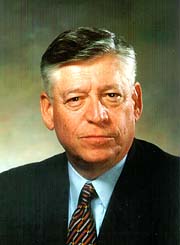|
February 23, 2004
Provost Chemers offers tips on effective leadership
By Jennifer McNulty
"I think I can, I think I can." Fans of the classic children's
book, The Little Engine That Could, will recognize those familiar
words as the mantra that saves the day.

Provost Martin M. Chemers |
They also illustrate a key component of leadership, according to Campus
Provost and Executive Vice Chancellor Martin M. Chemers, who gave a
campus talk about leadership February 19.
Chemers's talk was titled, "Heavy Mettle: The Role of Confidence
and Optimism in Personal Effectiveness." It was part of the Equal
Employment Opportunity/Affirmative Action's Diversity Lecture Series.
“A big part of mettle is reminding yourself of your competencies
and reminding your subordinates of their competencies,” Chemers,
a professor of psychology and former dean of the Social Sciences Division,
told a crowd of faculty and staff that filled Bay Tree’s Conference
Room D.
In his new post as campus provost and executive vice chancellor, Chemers
will have plenty of opportunity to demonstrate what he’s learned
during 40 years of research on leadership. Chemers’s own research
has focused on mettle, which he defined as “drawing on one’s
inner resources to do one’s best.”
An engaging speaker whose personal anecdotes and sports analogies bring
research principles to life, Chemers described the three facets of effective
leadership as:
• Image management, or establishing credibility with subordinates;
• Relationship development, which empowers subordinates to do
their best work;
• Resource deployment, or the ability to apply resources toward
the mission.
The keys to establishing credibility are proving one’s competence,
trustworthiness, and honesty, said Chemers. “The good news is that
of all the traits associated with leadership, honesty is the one that
is totally under your control,” he said. “If you’re honest,
you’ll lap the competition.”
Building relationships is trickier because some personalities need
more guidance than others to perform at their peak. The leader’s
task is to provide the appropriate level of guidance to “enable,
empower, and encourage” people, said Chemers. “It requires
almost a zen loss of self,” he said. “You have to be less
concerned about what you need and more concerned about what your subordinates
need. It’s one of the greatest challenges of being a leader.”
To be successful, work relationships must also be fair, just as marriages
and partnerships must be fair, said Chemers. Research has found that
subordinates are just as satisfied to have had a “voice” in
decision making as to have been a partner in the actual decision making
or to have made the “choice.”
“Subordinates want to know that the people who are making the decisions
are listening to them,” said Chemers.
By contrast, using power, or the ability to control the fate of others,
is “one of the weakest forms of leadership,” noted Chemers.
“You’ll only get the lowest level of performance. You can’t
get the highest performance out of people by threatening them.”
Effective leaders build highly motivated teams that help the leaders
accomplish their goals. In general, more authoritative leadership strategies
work in structured and predictable work environments, but leaders have
to be more flexible and open in environments where the work is less
well defined.
For 15 years, Chemers’s own research has explored the role of
mettle, or personal fortitude, in leadership effectiveness. He has conducted
research with ROTC cadets, college basketball teams, and fast-food managers,
among others. Components of mettle include confidence and optimism.
“When you believe you’re good at something, you’re better
at it than ability alone would predict,” said Chemers, citing research
conducted with eighth-grade math students. “When you lack confidence
in your abilities, you’re vulnerable to so many setbacks--you don’t
think clearly, you don’t use good judgment.”
Other components of mettle include reduced defensiveness, which enhances
sensitivity to the needs of others; higher goals and greater personal
commitment to achieving them; and positive expectations, which enhance
coping and perseverance. “People are most defensive when they’re
frightened of failure,” said Chemers. “When you believe in
yourself, you create an atmosphere that’s upbeat.”
Contrary to popular belief, Chemers said that years of research have
found no significant differences by sex or ethnicity in leadership style
or performance.
“Organizations socialize us to our cultures,” said Chemers.
“But expectations matter. When people don’t expect you to
be a good leader because of your gender or ethnicity, you’ll have
a much harder time. Those expectations are a burden. They weigh on you.”
Moreover, people remain vulnerable to stereotypes, researchers have
found. One study found that women who were reminded of the negative
stereotypes about women and math did less well on a math test than the
women who were not reminded of the stereotype before the test.
Mettle can help ease those burdens, though, said Chemers, citing research
that showed that mettle becomes an even more powerful factor under conditions
in which it is difficult to lead, including when leaders face prejudice.
Better yet, efficacy can be gained over time as individuals master
the tasks before them, observe people like them in similar roles, and
receive positive feedback from others, said Chemers. The development
of efficacy has proved valuable to “nontraditional leaders,”
including women and people of color, as well as first-generation college
students, he said. “That’s one of the reasons it’s so
important to have minorities in university teaching and staffing positions,”
said Chemers. “Minority students need to see minority faculty to
know it’s a possibility for them.”
Leaders can and do make a difference, emphasized Chemers, who cited
last year’s impressive midseason transformation of the Florida
Marlins baseball team after a new manager was brought in. Halfway through
the season, the team wasn’t going anywhere, but the new manager
arrived and led the Marlins to a World Series victory. “That’s
leadership,” said Chemers. “Something happened to coalesce
those people.”
Return to Front Page
|